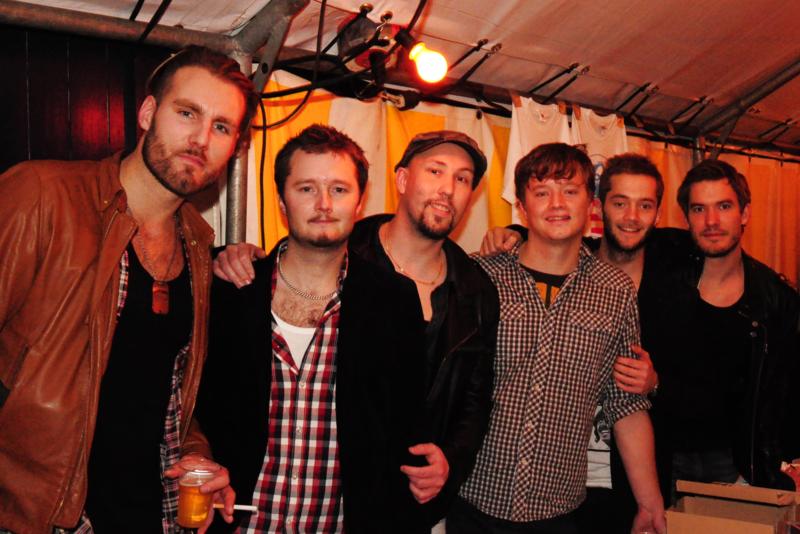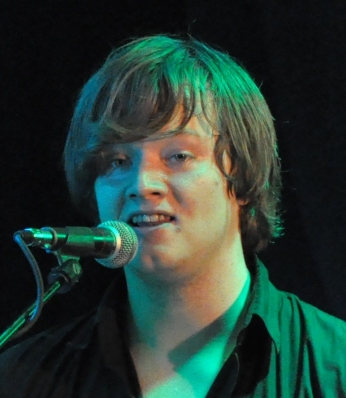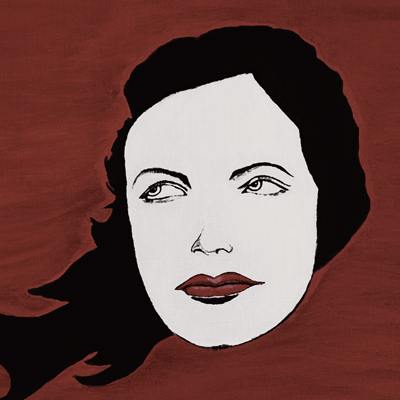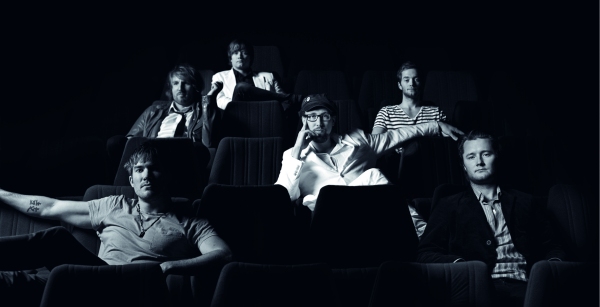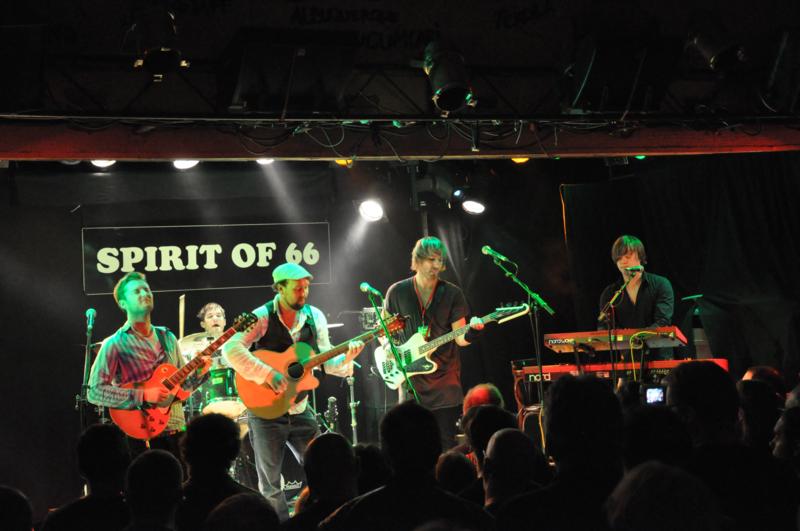|
Interview Moon Safari “Everyone has a role in the professional side of Moon Safari that everyone else respects” (November 2011, text by Henri Strik, edited by Peter Willemsen, pictures by Arthur Haggenburg) Without doubt Moon Safari is one of the best Swedish progressive rock bands around. The band already released three excellent studio albums: A Doorway To Summer (2005), Blomljud (2008) and their latest release Lover's End (2011, see review). On stage they're quite impressive either with their outstanding close harmony singing. Therefore it's time for Background to spotlight this great band by interviewing bassist-vocalist Johan Westerlund, guitarist-singer Petter Sandström and keyboardist-singer Simon Äkesson. Congratulations with your latest effort Lover's End. In my opinion this is a true masterpiece. Do you consider it your best release to date? Johan Westerlund : “Absolutely, it just feels like our most complete recording to date. The small imperfections we wished we could have changed on the previous albums are simply not present on Lover's End. I'm not saying we can't make better songs or better arrangements, but the general feeling about the album - and I think this applies for all band members - is that it's finished. Sometimes you don't have that feeling and you want to change details in the music, in the mix or in the way the mastering was done, but this time we could leave it untouched, I think.” | ||||
| ||||
|
When did you start working on Lover's End? Did you have any problems during the recordings? Johan Westerlund : “Not really. As always we recorded the drums and the organ in studio Spiff in Skellefteå. This was already done before Christmas 2009. Then we moved to Petter's living room and recorded everything else during spring and early summer of 2010. The only problem we really encountered is that we always have to push ideas aside because of the limited amount of time we have to spend on the band. We got a huge pile of what I think is brilliant material just lying by waiting to have its potential realized. This is the way it has been right from the start. It's a classic situation I suppose, but we're hoping to be able to spend more time on Moon Safari in 2011 and 2012 so that we can release a great album in the autumn of the latter year.”Why didn't you mention the line up in the booklet of the album and why did Sebastian Åkesson join the band as a sixth member? Would you please introduce him? Johan Westerlund: “Actually there wasn't a real reason. Fredrik and I, our current go-to guy when it comes to art direction, sat around for quite some time trying to get the lay-out of the pages for the booklet in order. As we did the last one, where the line-up was supposed to be, we became really picky about the looks of the pages; it just didn't fit the way we wanted. I realize that it might seem strange. We were supposed to add it for the second print of the album, but we don't seem to get around to it. Moreover, people already know who we are; there's no point in stating the obvious. Of course Sebastian Åkesson should have had a proper introduction, so in that sense it was a mistake. However, he really isn't that big of a mystery. We just needed another voice and another set of hands for the second keyboard. Everyone in the band knew Sebastian and what he was capable of since way back. Now that he was finally legally able to drink in most countries, we figured it was about time for him to come along. Besides he attracts younger women that we normally have during gigs so that's another plus.”In my review I mentioned the strong harmony vocals on Lover's End comparing it to a barbershop quintet. I even mentioned possible influences from The Beatles, The Beach Boys, Crosby, Stills, Nash & Young, Yes and The Flower Kings. Did these names influence you and can we indeed compare you to a barbershop quintet?
How much practice did it take to obtain these strong harmony vocals and how did you record them? Simon Äkesson : “My brothers and I have sung a lot of harmonies since we were kids, so for us it's a natural way of singing. It wasn't hard to 'infect' the others in the band with the joy of harmonizing. However, it helped that they were naturally talented singers. In Moon Safari we often practice our vocals when we travel by car through the vast Swedish countryside and because we sing together for quite a number of years now, it sounds so well. We all have to think more while we sing. Sometimes the new harmonies come close to something they've done in other songs, so the notes are already in the heads. They make sense rather quick when they start singing, but there are still really tricky parts that we need to practice a lot to get them right. When we record our vocals we always start with the lead in order to establish the feel of the melody. Often the lead is on top, but sometimes it's in the middle as well. Our standard set-up is T1: Simon, T2: Petter, T3: Pontus, T4: Tobias and baritone: Johan, bass: Sebastian, but that also changes depending on who's singing the lead. Our three-part arrangements are often sung by myself, Pontus and Petter, but on NYC Summergirl for instance you've got Johan singing the lead and me and Petter singing one harmony each. It also happens that we record more harmonies than we have band members and then I sing those harmonies. We then find a way to slim the arrangement for the stage performance. Therefore it's great that Sebastian has joined the band so we now have six voices. We've got one eight-part piece on Bluebells, but in general six voices are enough. Lately we've also started to adapt our recordings to make sure that they can be performed live.”Petter, why did you call the album Lover's End? Does it have a certain theme or a concept? Petter Sandström: “I called it Lover's End because that's where I was at the time of writing the album. I wanted to be completely honest in the lyrics and avoid the abstract psychedelic nonsense that everybody does so well in this genre. As the writing
Does the face on the cover have a certain meaning? Where was this image taken from? Petter Sandström : “Some people say it's the face of my ex-girlfriend. I say it's Ingrid Bergman. The cover is vaguely based on the Casablanca-poster.”The picture in the middle of the booklet reminded me of a picture shot for the debut album of the German band RPWL. Do you know that one? How did you shoot your band picture? Johan Westerlund : “Well, we don't really know RPWL or how their booklet looks; we'd just been talking about the movie theatre as a fitting place to shoot the official photo for the album, because the cover has a movie poster feel to it, and the photographer knew a guy, who knew a guy, so we could borrow a local theatre for an afternoon. These were the only photos that didn't have one or more members of the band blinking, drooling or scratching some inappropriate place. It really came natural.” | ||||
| ||||
|
The picture at the back indicates that you as a band have a lot of fun together, not only on stage but also private. Did it help that you have all been friends for such a long time and that some of you are brothers? Johan Westerlund : “I suppose like with every tight-knit group, there's a bond that can't really be broken all that easy, so we feel quite comfortable both laughing and fighting each other and I guess with three brothers in the band that bond is even stronger. We just compliment each other really well. I think that's the main reason why we like hanging out so much; everyone has a role to play in the professional side of Moon Safari that everyone else respects. In return this makes the private situation outside the band really simple and relaxed. We're going to stay together until we're ninety, Simon always says. Let's hope he's right.”How important are the lyrics mainly written by you and Petter Sandström? Johan Westerlund: “For this album in particular the lyrics meant more than they normally do. Dealing with the loss of love is of course much more personal and more important than the lyrics of some of the earlier stuff. Petter started writing about things he was going through in his life and I just followed to the general area where he was going, thematically.The odd thing is that Lover's End became a self-fulfilling prophecy, because after the title and the theme were set both me and Tobias broke up with our girlfriends. However, some of the lyrics are not written with the heaviness of A Kid Called Panic, for instance. I mean, some are just reflections of life in general and are not to be taken literally or too seriously.”
How difficult was it to write these lyrics? To what extend were you involved in these stories? You took a trip to Harlem for example to see your lonely angels of New York City Summergirl and you shot yourself down August 2008 in the song A Kid Called Panic. Petter Sandström : “I think it was hard emotionally and we kind of weighed every word in gold. I don't want to go into any details about the lyrics, but in retrospect I'm glad we went down this road.”Johan Westerlund: “ New York City Summergirl wasn't hard to write at all; the woman in the lyrics is of course a figment of my imagination. She's fictitious and that's also the whole point of the song. It's about longing for something that you have made up to be great in your head, and how it sometimes can make what you actually have, that's flesh and blood, that's real, seem bleak and uninteresting. Fantasies are both exciting and dangerous at the same time, the better person inside might know that the grass won't be greener on the other side, but the lesser person might need the rush anyway. To balance those two individuals within one mind can sometimes be over-bearing, and it's one of the greatest challenges I've met in my life. The lyrics in the acapella section in the end say it all really.” At the end of New York..., I heard a small section played on the piano from Frank Sinatra's Theme From New York, New York. Who came with the idea and did you need permission to use this part of this song written by John Kander? Johan Westerlund : “It was a rather obvious choice, but it wasn't intended to be there. When Simon recorded the piano he just started goofing around with the theme. It's really the kind of thing that we used to do in the beginning of our musical friendship. We always made up silly intros with vocals or bossanova endings and so on. Seeing how this small piece really also works with the theme of the song and the playfulness in it, we just let it stay like that. If you ask Simon he would say: 'It's what 'old Moon' would have done'. And no, we are not currently being sued by his estate for the theft of his super original chord progression.”The first notes of Crossed The Rubicon strongly remind me of the beginning of Joe Cocker's With A Little Help From My Friends. Are you aware of this? Petter Sandström : “No, we're not. You're the first one to mention this. With A Little Help by Joe Cocker is an excellent song though and one of the few really good covers of a song of The Beatles. When we made the intro, I had the chord sequence for the verse and the bridge and Simon wanted - what he calls - an army of twelve string guitars to start the song. Well, I have to listen to Cocker's tune now.”The first album A Doorway To Summer was co-produced by Tomas Bodin of The Flower Kings. How did you get him to do it? Have you learned enough from him to produce the other two albums yourself?
Your website on MySpace is named after We Spin The World, a song from the debut album. Why? Do you really spin the world? Johan Westerlund : “Well, I'm not sure one should read too much in that name. When we started our MySpace-site the name Moon Safari was in use so we had to choose another name, and I don't think we reflected much when choosing 'we spin the world'. However, we all like this song and we played it all the time in the beginning so it was a natural choice. And, yes, of course we spin the world.”During the 10th Convention Prog-Résiste last year in Verviers, you already mentioned that the band intend to release a live album instead of a DVD. Is that still true or did you change plans? Johan Westerlund : “We're actually preparing the audio we recorded at Rosfest for mixing right now, and we'll release it as a live album called The Gettysburg Address On Nov 19th. It's going to be a double album. We're really happy with the basic tempos and the energy in that recording, so we believe we can make something really special provided that the mix is done properly. It might be this year's Christmas present!” | ||||
| ||||
|
During this Belgian festival you said on stage that the Spirit Of 66 has the best audience and Belgium the finest beers in the world. Petter Sandström also said that Verviers is the capitol of prog and Moon Safari are the best band in the world. Was that just a way to break the ice? Johan Westerlund: “I suppose we think quite a lot of ourselves, don't we? No, but seriously, if you go up on a stage with another attitude, you'll probably fail miserably. At the Spirit Of 66 you do feel like being the best band in the world, the audience is superb and so is the sound in the venue. And then the trapist beer... need I say more? As for the capitol of prog, we don't know yet, we'll have to tour some more before we can say that for sure, but Verviers is on the shortlist.”During that performance Moon Safari played a fantastic medley of Doorway/Beyond The Door which sounded superbly. I guess you play that medley at all gigs. Who came with that perfect idea? Petter Sandström: “We used to play both Doorway and Beyond The Door live. I think it was after we got home from Würzburg a few years ago, that we combined Beyond The Door and Doorway in this clever way during a rehearsal. We all think this version works better live and I think Beyond The Door has the bigger ending, which we of course have made a little longer and bigger!”What kind of music do you all listen to? Can you make a living with recording and performing or do you all have a regular daytime job? Johan Westerlund : “We all listen to different things, and I think you can hear in our music that we're not really a progressive rock band, but we like the acceptance that exists within the genre regarding song length and depth. If you would cut the pop and folk segments out of our songs we would not have any soul left, but if you would cut the typical prog rock parts out we'd still be Moon Safari. When we play our music live we really enjoy playing those parts that are structurally difficult and challenging, just because they are challenging. We hope we can keep that adventurous spirit in our future releases regardless of which direction it will take us and regardless if that means we have no place in the world of mainstream music. We don't mind our daily jobs that much that we would sell out.”My final question: who invented the name Moon Safari? Johan Westerlund: “It's just a name that appeared at the end of an MTV video back in 2000. I had no idea what the band Air was all about, and I don't think any of us did when Petter and I decided on that name. We just liked the sound of it, it has a dreamy feel that we probably felt would go well with the style of music we were contemplating. And it still makes sense, in a way.”Thanks for answering my questions and good luck for the future! Johan Westerlund: “Thank you and I hope to see you guys when we play again in your country!”More info about Moon Safari on the Internet: Moon Safari Website samples review album "Lover's End" review 'Moon Safari 2011 Live at Progfarm' review 'Moon Safari 2010 Live at Prog Resiste Festival' review 'Moon Safari 2009 Live at SymForce3' |
